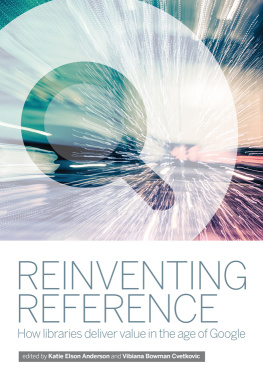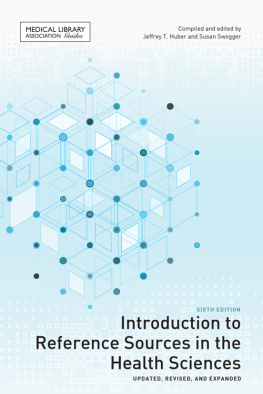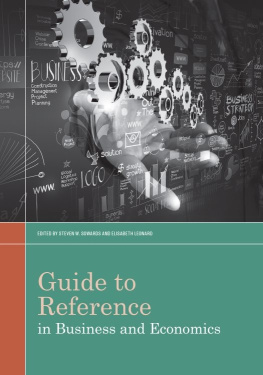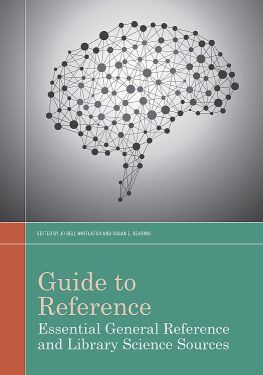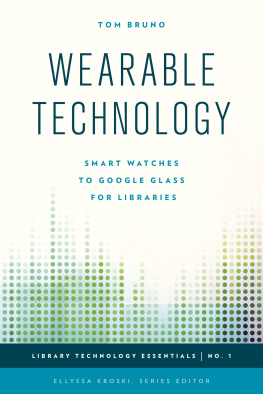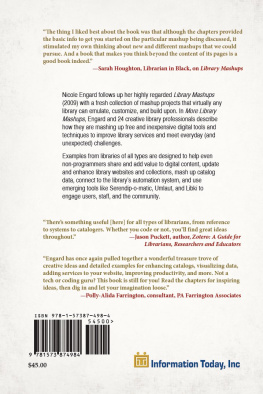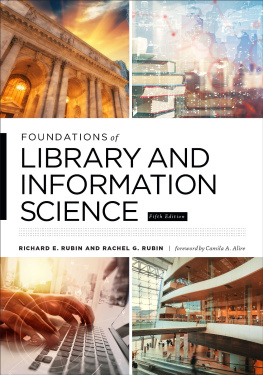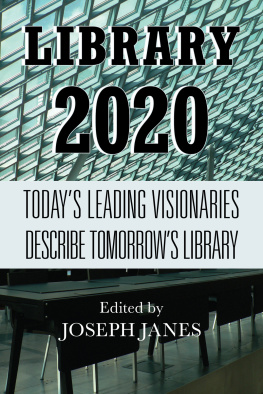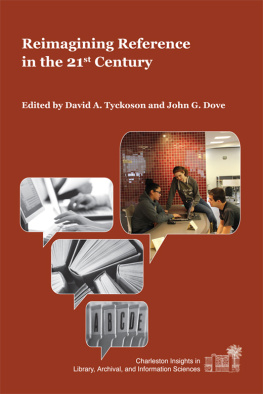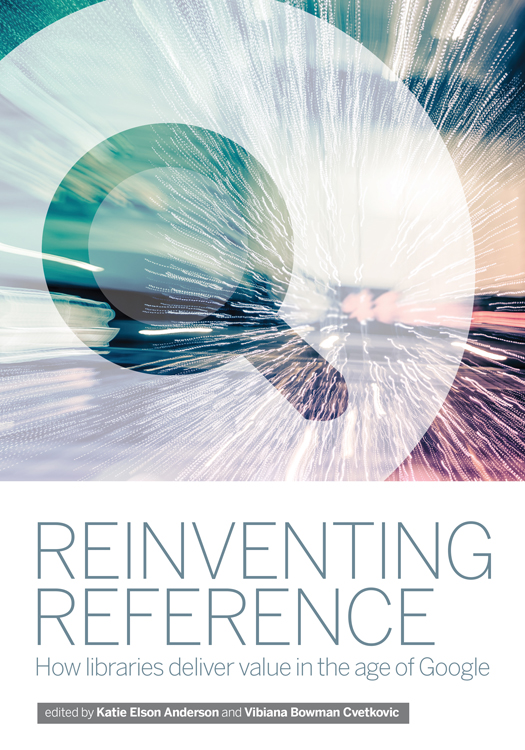
ALA Editions purchases fund advocacy, awareness, and accreditation programs for library professionals worldwide.
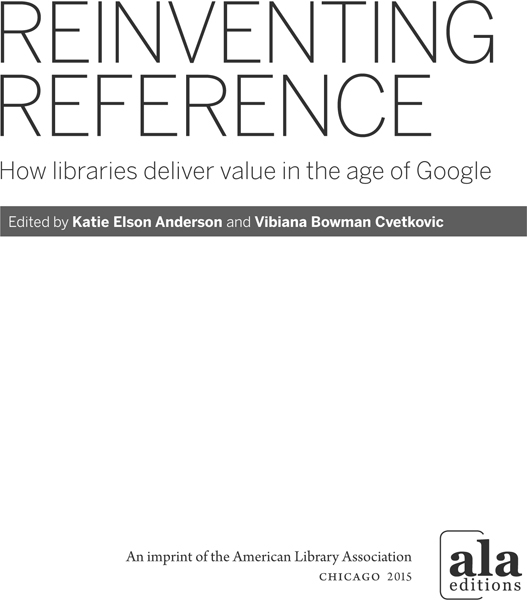
Katie Elson Anderson is a reference and instruction librarian at the Paul Robeson Library, Rutgers University, Camden, New Jersey, and the coeditor of Stop Plagiarism: A Guide to Understanding and Prevention. Publications include chapters in Teaching Generation M: A Handbook for Librarians and Educators, Sages 21st Century Anthropology: A Reference Handbook, and Portrayals of Children in Popular Culture, A Handbook.
Vibiana Bowman Cvetkovic is reference librarian and web administrator at the Paul Robeson Library, Rutgers University, Camden, New Jersey. Her other books include Stop Plagiarism: A Guide to Understanding and Prevention and Scholarly Resources for Children and Childhood Studies: A Research Guide and Annotated Bibliography. She has also published in various refereed journals and library and information science publications. In 2005 she was named a Library Journal Mover & Shaker.
2015 by the American Library Association
Extensive effort has gone into ensuring the reliability of the information in this book; however, the publisher makes no warranty, express or implied, with respect to the material contained herein.
ISBNs
978-0-8389-1278-2 (paper)
978-0-8389-1285-0 (PDF)
978-0-8389-1286-7 (ePub)
978-0-8389-1287-4 (Kindle)
Library of Congress Cataloging-in-Publication Data
Reinventing reference : how libraries deliver value in the age of Google / edited by Katie Elson Anderson and Vibiana Bowman Cvetkovic.
pages cm
Includes bibliographical references and .
ISBN 978-0-8389-1278-2 (print : alk. paper)ISBN 978-0-8389-1286-7 (epub)
ISBN 978-0-8389-1285-0 (pdf)ISBN 978-0-8389-1287-4 (kindle)
1. Reference services (Libraries) 2. Electronic reference services (Libraries) 3. Reference services (Libraries)Information technology. 4. Reference librariansEffect of technological innovations on. 5. LibrariansProfessional ethics. 6. Libraries and the Internet. I. Anderson, Katie Elson, 1973editor. II. Cvetkovic, Vibiana Bowman, 1953editor.
Z711.R47 2015
025.5'2dc23 2014031542
Cover design by Kimberly Thornton. Images Shutterstock, Inc.
CONTENTS
by Katie Elson Anderson and Vibiana Bowman Cvetkovic
Julie M. Still
Zara Wilkinson and Vibiana Bowman Cvetkovic
Susan J. Beck
Gary Golden
Lawrence V. Ghezzi and Walter Johnson
Justin Hoenke
Sara Harrington
John Gibson
Stephen Abram
by John Gibson
Referencing the Future
Katie Elson Anderson and Vibiana Bowman Cvetkovic
A survey of recent articles in library journals underscores an unsettling trend. Cities and towns across the United States are curtailing library hours, services, and (all too often) closing the doors. Public libraries in Pittsburgh, Philadelphia, Camden (New Jersey), Charlotte (North Carolina), and Boston have all cut services or closed branches. Public, school, and academic libraries have to deal with shrinking budgets, increasing numbers of students, and decreasing numbers of employees. Many library schools, the institutions whose charge it is to prepare the next generation of professionals, are also facing hard times. Some library schools are broadening their focus. The School of Communication, Information and Library Studies at Rutgers University, for example, is now the School of Communication and Information. Others, like the libraries themselves, are closing their doors and shutting off the lights. However, the profession is not ready to put itself on the endangered species list. Scholars, administrators, and practitioners from all aspects of librarianship are reimagining the profession as well as how information services can be delivered. The goal of this book is to contribute to that effort.
Reinventing Reference takes a critical look at the megatrends and factors (such as public policy, economics, and popular culture) that affect current library policy and practice regarding the process of delivering information services and that will continue to affect them into the foreseeable future. The contributors to this work, which include library leaders and visionaries, place these issues in historical and cultural contexts and offer practical solutions for new paradigms of reference service for all users. They also project how library services will be reshaped by new and emerging technologies.
Reinventing an Image and a Profession
The chapters in this book focus on how different libraries are adapting to the social, cultural, and technological changes that are constantly being presented to them. Librarians and educators address these changes in different ways, providing a variety of perspectives based on their research, experience, and workplace environment. These different experiences and perspectives help to provide the reader with the tools and information to move forward into the future of reference. The diverse librarian voices represented in this book are just a small sample of professionals who embrace reference librarianship in this changing and challenging time.
This is both an exciting and uncertain time to be a reference librarian. As a whole, the profession seeks to march forward with technology while not losing sight of convention and the principles reference professionals hold dear. Some chapters in this book focus on the current state of reference, detailing the challenges faced by reference librarians in academic, school, public, and special libraries as they forge ahead into the future. Other chapters look to the future to ascertain what the state of reference librarianship will be in years to come. Any discussion of the current and future states of reference should include a brief examination of the image of the reference librarian in popular culture because it is this perception of the profession by the general public that can either help or hinder a reference librarians ability to provide services to patrons in any type of library.
The image of the librarian in popular culture has been examined, discussed, argued, mourned, and praised. Academic articles, conference presentations, books, blogs, and social media sites address the stereotypes and images of the library profession in popular culture. Much of the discussion involves how librarians are depicted in popular movies, television shows, and print and how this may affect the profession. It is difficult to make it through library school without someone referencing the movies Desk Set or Party Girl, quintessential viewing for librarians in training. If those movies are not enough, there is an annotated filmography (Raish 2011) that, while no longer being updated, is still the most complete listing of librarian appearances on the big screen. Many of the movies on the list, as well as television shows and other media, perpetuate the popular images of a librarian: female, introverted, sexy in an intellectual sort of way. Male librarians, when actually depicted, tend to be characterized as gruff, overzealous protectors of libraries and the books they contain.
It is unfortunate that many of the images of libraries and librarians in popular culture are not entirely positive, especially when the target is a younger audience. Future library patrons and supporters are being exposed to the perpetual image of the library as a dark and foreboding place of knowledge with intimidating librarian guardians. The librarian in the popular Harry Potter movies and book series, Irma Pince, is protective and possessive of the books in the library and is described by the books own fans on the Harry Potter Wiki (2012) as a severe and strict woman... thin, irritable and looked like an underfed vulture. As such, she was deemed highly unpleasant by most of the student body. The continuance of the image of the librarian as protector of books is also present in fantasy writer Terry Pratchetts popular Discworld series, whose librarian is an orangutan who was once human but prefers to remain in primate form so as to better terrify library patrons. He protects his library and the viscous, hairy books with teeth, which are tethered on chains in a rather menacing way. Another popular book among young students is
Next page
